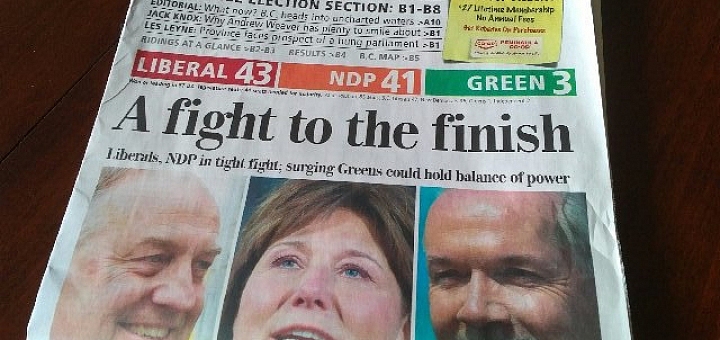I was sitting on my deck on the day after the BC provincial election, contemplating the outcome (as it stands — it may change) and feeling — intrigued is the word I’m looking for — at finding myself living in a riding with a Green MP and a Green MLA. And the irony hit me. They issue burn permits here on Salt Spring Island, and down the hill from our place on a lot that’s being cleared so a new house can be built, they’ve had this massive bonfire going. Or maybe I should call it a bonsmoke, because they’re obviously burning green wood — branches from freshly felled trees. The smoke from this fire has been billowing from dawn til dusk for the better part of a week now, at times obscuring our view of the water, dropping little bits of ash on the deck, the chairs, the railing and even the laptop, and making the neighbourhood smell like, well, a very smoky bonfire.
If you’re reading this in Calgary, your air quality right now is a good deal better than mine.
I suppose I could lodge a complaint. But I also have to consider that they’ve taken down enough trees to give us a better view of the water than we had when we bought this place while at the same time leaving enough big trees standing that you can’t actually tell that they’ve removed any trees. So it’s the best of both worlds, and once they’re done burning, they’ll have done us a huge, unexpected, absolutely free favour.
Sometimes you just have to wait for the smoke to clear.
It’s a lot like that with the BC election results.
Nothing is actually resolved yet. When they finished counting the votes early Wednesday morning, the BC Liberals were one seat shy of a majority, the NDP just two seats back of the Liberals, and the Greens — with 3 MLAs elected — holding the balance of power.
That these are the final standings is by no means certain. Recounts in up to half a dozen ridings could change the results — the New Democrat beat the Liberal by just 9 votes in Courtenay-Comox, the closest race — and perhaps as many as 200 thousand absentee ballots still need to be counted. If you’re eligible to vote in BC, you can vote at any polling station in the province. But you still vote for one of the candidates your home riding, and your ballot is sent to the returning office in your riding for counting. Convenient for you, but in a close election like this one, it means a two-week wait to know officially who actually won this thing and whether they got a majority.
But let’s say the results stand and Christy Clark finds herself heading a minority government. Or even that the final results flip a seat or two in the Liberals’ favour and she squeaks back in with a narrow majority, because the odds of it getting any better than that for her are slim at best. For that matter, let’s say a seat or two flips in the NDP’s favour and John Horgan finds himself leading a New Democrat minority government (because the odds of the NDP ending up with a majority are pretty much non-existent). Suddenly, the three Green MLAs hold all the cards in this House (yes, that was a play on House of Cards).
Should you be worried?
Over the short term, you need not be. Minority governments — or governments with majorities so slim that they’re one or two absent members away from losing a non-confidence vote in the House — often turn out to be the best governments we get. Why? Because it’s the one scenario in which it’s in politicians’ self-interest to put the public interest ahead of their own.
But won’t the opposition try at every turn to bring the government down? Actually, no, because unless they do so at just the right time for the right reason over the right issue, the voters will punish them for causing an unnecessary election. For the Official Opposition — the party that finished second — that could mean a greatly diminished seat count in the next Legislature. In a scenario were the third party holds the balance of power with a mere handful of members — like the BC Greens, with 3 MLAs — it is a virtual guarantee that they won’t have nearly the influence after the election that they had beforehand, and the voters may eliminate them from the game altogether.
And the governing party? The governing party wants to make a minority government work until it can call the next election at the time of its choosing, such time being when its popularity with the voters has risen enough that it might get re-elected with a majority. So that means — even for someone like Christy Clark, who doesn’t play well with others — co-operating, collaborating, working across party lines, compromising, swallowing one’s pride, doing what one must to stay in power, and often (oddly enough) providing good government as a result.
The first casualty of minority government is the governing party’s firmly held positions. They simply won’t fly when you have to rely on others to keep your job. That applies whether the Liberals or New Democrats end up being declared the winners.
But where the Greens are concerned, we’re dealing with a wholly different dynamic.
The three Green MLAs — leader Andrew Weaver, Adam Olson, and Sonia Furstenau — have just won the lottery. They will hold the power to determine who gets to govern this province. Even if the standings on election night hold — Liberals 43, NDP 41, Greens 3 — the Greens could cast their lot with the New Democrats and the Liberals would no longer be government. Or they could side with the Liberals. Or they could join a formal coalition with one party or the other in exchange for one or more cabinet posts. Or — and in Canada, this is what most third parties do in a minority scenario — they could take it bill by bill, issue by issue, deciding on a case-by-case basis whether to vote with or against the governing party.
So what are the Greens likely to demand in exchange for their support? They’ve already made their first priority clear — a ban on corporate and union donations to political parties. That is much needed in BC and if the Greens can compel the government to make it happen, they will have done all British Columbians a favour.
Meanwhile, back in Alberta there is much handwringing over what now becomes of the twinning of the Kinder Morgan Trans-Mountain pipeline. The Green Party’s strength is on Vancouver Island and the Gulf Islands; the NDP’s is in Metro Vancouver, the lower mainland and VanIsle. In all these regions, opposition to the pipeline is intense. Only the BCLibs “support” the pipeline (I’ll explain my reason for the quotation marks in a second) and their hold on office is suddenly tenuous. This suggests troubled times are ahead for the pipeline and for the political fortunes of both the Notley and Trudeau governments if they can’t get it done.
Except…troubled times have always been ahead for Kinder Morgan and for the difficult balancing act the Alberta and federal governments have undertaken by backing it. In the final analysis, approving a pipeline — and making sure it gets built — is a federal responsibility. Natural Resources Minister Jim Carr says the election results won’t change the federal government’s support for the project — a point he says the feds will reinforce when they meet with the new BC government, once it’s been established who that actually is.
And now I come back to why I put “support” in quotation marks. Like the troll living under the bridge, Christy Clark only came around to “supporting” the pipeline after forcing Kinder Morgan to pay BC a billion dollars over 20 years. The clear message from this as well as so many other surfaces where you find Clark’s fingerprints is that her “support” is always for sale — which means she’s on your side until she gets a better offer.
So, like I say, it’s always been “troubled times” for the Kinder Morgan project. The BC government can make the road bumpy but cannot block it. It all comes down to the political will of the federal government to see it through — as it always has.
Sometimes you just have to wait for the smoke to clear.







Leave a Reply